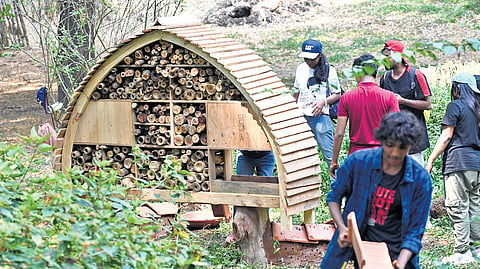

BENGALURU : To foster engaging habitats for insects, Ernst and Young - Global Delivery Services (EY-GDS), a multinational professional services collaborated with NGOs - Bhumi and Vibhinna India Foundation - to establish eight insect cafes at Lalbagh Botanical Garden to enhance insect conservation and improve their overall ecosystem.
The set-ups are placed at eight locations within Lalbagh as directed by the horticulture department, to ensure visitors’ safety and minimal human intervention. The innovative set-ups were inaugurated by DS Ramesh, director of Department of Horticulture on Friday. “This marks a crucial step towards protecting and nurturing indispensable insect species. Left without their safe habitats to support, reproduce, and thrive, many insects are nearing extinction, and this could significantly endanger the food chain,” Ramesh said.
Rumi Mallick Mitra, director of Corporate Responsibility at EY-GDS said, “Eco-friendly cafes have been constructed using upcycled wood, mud, and bamboo, providing secure nesting grounds for a diverse range of insect species. Intensive agricultural practices have posed significant threats to insect populations, especially vital pollinators like bees, and have disrupted the delicate balance of the food chain. Hence, these insect cafes, akin to the cafes people often visit intend to enhance the overall ecosystem.”
The space is constructed with wooden blocks, each containing holes for bees to rest. Additionally, a block is provided for placing cow dung, which bees typically inhabit. The lower section of the structure features loose mud compartments for ants.
The entire design is sloped to resemble a hut, to shield the space from rain. The collaboration includes 21 such insect cafes. Apart from the eight inaugurated on Friday, seven others were established at Doddasaggere Botanical Garden in March and six others will be set up in Cubbon Park by June.